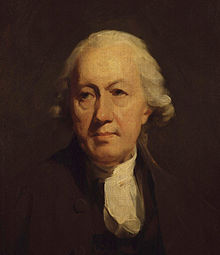John Home
|
John Home FRSE |
|
|---|---|

Portrait, oil on canvas, of John Home (1722–1808) by Sir Henry Raeburn (1756–1823), circa 1795–1800
|
|
| Born |
13 September 1722 Ancrum, Roxburghshire or Leith near Edinburgh |
| Died | 4 September 1808 (aged 85) Merchiston Bank near Edinburgh |
| Education | Leith Grammar School |
| Alma mater | University of Edinburgh |
| Genre | Playwright |
| Notable works | Douglas |
Rev John Home FRSE (13 September 1722 – 4 September 1808) was a Scottish minister, soldier and author. His play Douglas was a standard Scottish school text until the Second World War, but his work is now largely neglected. In 1783 he was one of the joint founders of the Royal Society of Edinburgh.
He was born at Ancrum in Roxburghshire, but moved to Leith, near Edinburgh, in early childhood when his father, Alexander Home, a distant relation of the earls of Home, became town clerk. He was born on 13 September and christened on 22nd September 1722
John was educated at the Leith Grammar School, and at the University of Edinburgh, where he graduated MA, in 1742. Though interested in being a soldier, he studied divinity, and was licensed by the presbytery of Edinburgh in 1745. In the same year he joined as a volunteer against Bonnie Prince Charlie, and was taken prisoner at the Battle of Falkirk. With many others he was carried to Doune castle in Perthshire, but soon escaped.
In July 1746, Home was presented to the parish of Athelstaneford, East Lothian, left vacant by the death of Robert Blair. He had leisure to visit his friends and became especially intimate with David Hume who belonged to the same family as himself. His first play, Agis: a tragedy, founded on Plutarch's narrative, was finished in 1747. He took it to London, England, and submitted it to David Garrick for representation at Drury Lane, but it was rejected as unsuitable for the stage. The tragedy of Douglas was suggested to him by hearing a lady sing the ballad of Gil Morrice or Child Maurice (FJ Child, Popular Ballads, ii. 263). The ballad supplied him with the outline of a simple and striking plot.
...
Wikipedia
